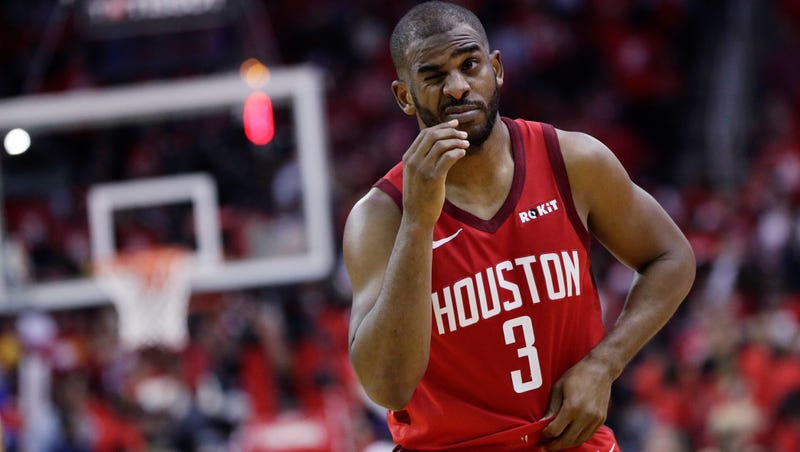
Please allow me to spoil the various blogs picking out the winners and losers of Thursday night’s blockbuster trade sending Russell Westbrook to the Houston Rockets in exchange for Chris Paul and some draft goodies. The loser is Chris Paul, who had his ass kicked.
The more fascinating end of this trade is Houston’s, where general manager Daryl Morey evidently believes that $170 million worth of Russell Westbrook is not only better for his team than $124 million worth of Chris Paul, but is also worth a whopping four years of control over Rockets first-round draft picks. That’s a pretty remarkable turnaround from where things sat less than a month ago, when a flop-sweating Morey was insisting that Paul would be on the Rockets next season, because everything between him and James Harden was hunky-dory. Remember this?
Mike D’Antoni will have an even harder time figuring out a mutually agreeable distribution of offense with Westbrook and Harden than he did with Paul and Harden, but there can no longer be any doubt that the Rockets. They just traded him for a declining 30-year-old point guard coming off his most inefficient season in most of a decade, with even more years and dollars left on his contract, and they unloaded a reasonable haul of draft picks in order to make it happen. Yesterday the argument was whether the Miami Heat would part with a single player or pick of positive value in order to acquire Westbrook; today Morey mortgaged a chunk of his team’s future and offloaded one of the most celebrated veteran point guards in basketball history. Even squinting very hard it’s tough to view Westbrook as an upgrade in either pure basketball terms or as an abstract asset. The Rockets did not want Chris Paul.
On the Thunder end of the deal, the score is the draft haul—Paul’s salary, if he sticks around, would make them marginally more expensive over the next three seasons while realistically bringing them not at all closer to being a legitimate contender in the absolutely loaded Western Conference. Based on everything they’d done prior to Thursday night, it would’ve been reasonable to assume that any eventual Westbrook trade would be designed to hurl Oklahoma City immediately into a tanking posture. Paul is good enough all on his own to keep them from bottoming out, but with the draft lottery rejiggered, that probably doesn’t matter so much.
Point is, if the Thunder stay competitive at all next season, they are not likely to be competitive enough to matter, and most of their offseason has now been dedicated to asset collection. Usually that portends a rebuild, and Chris Paul is entering his age-34 season. This is not generally the point in a player’s career where they want to be going from a legitimate championship contender to a small-market franchise whose next round of core players is probably still in high school.
So this is a big downgrade for Paul. The good news is, he can still play—as pointed out by Kevin O’Connor of The Ringer, Paul’s box score production without James Harden on the floor last season was excellent, and the Rockets were almost six points better by net rating with Paul on the floor than off. The other good news is, it sounds like Oklahoma City might route Paul along to someplace else in something like a salary dump, where he might have a better chance of getting back to the playoffs before his 38th birthday:
Two months ago Paul was the second-best player on a 53-win team in the second round of the Western Conference playoffs. Two hours ago he was the second-best player on that same team in a conference that has lost its juggernaut and appears more wide open than it’s been in years. Now he’s the best player on a rebuilding lottery team in cow country, hoping his new general manager has enough accrued draft picks stored up to make him somebody else’s problem. That is a rough Thursday
You need to be a member of NASTYMIXX to add comments!
Join NASTYMIXX